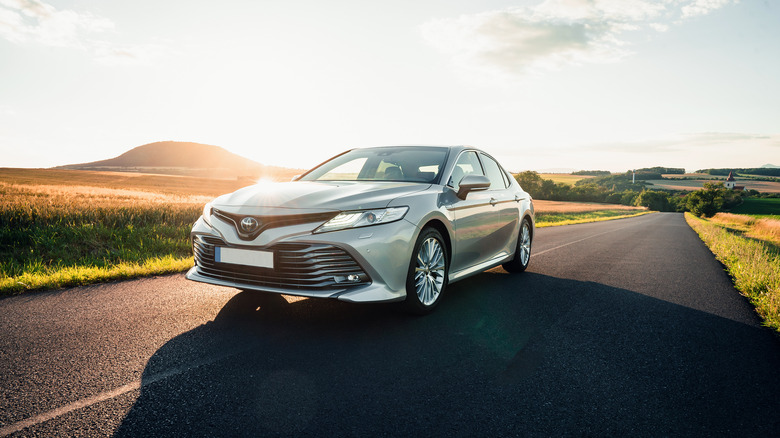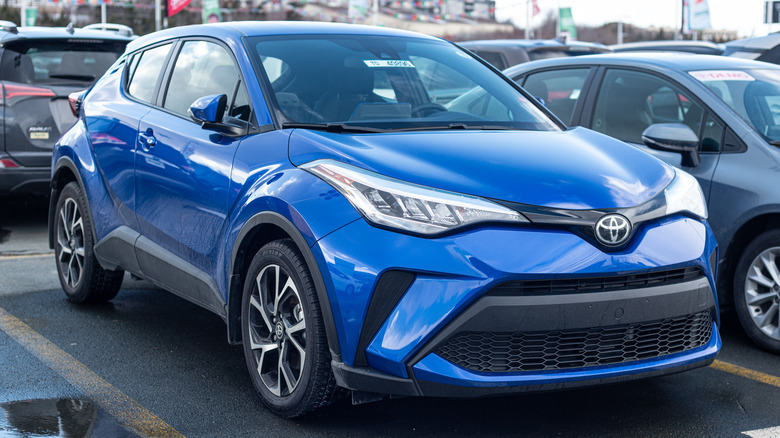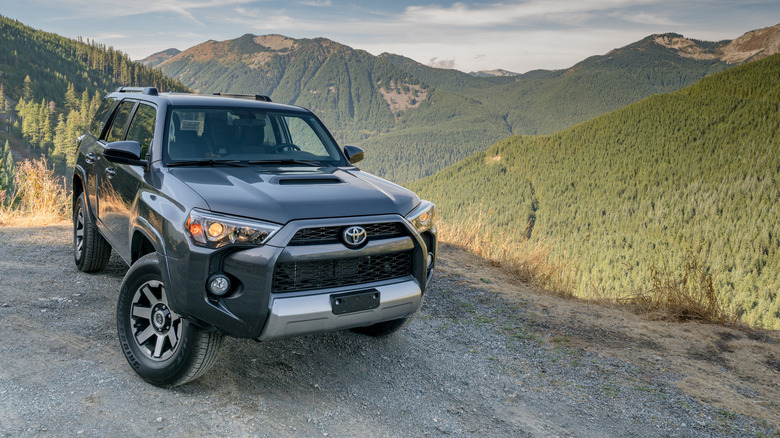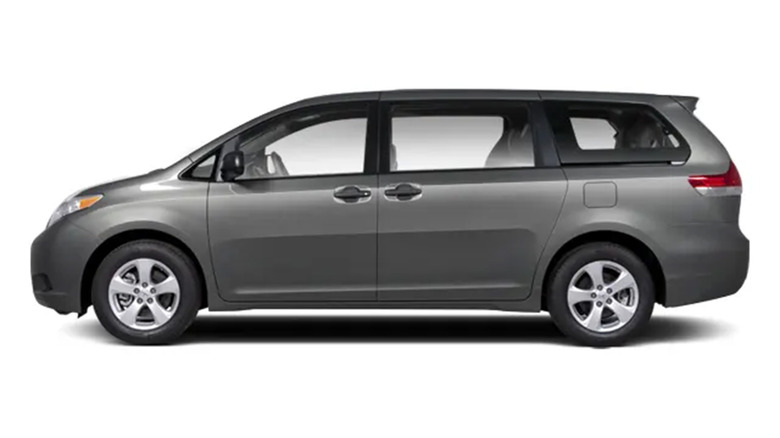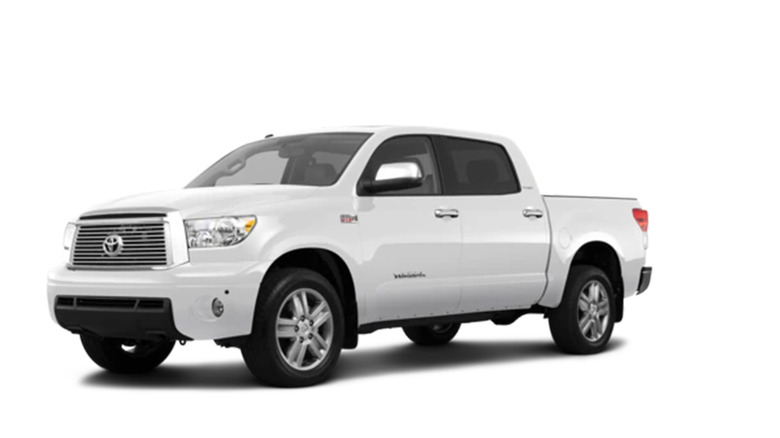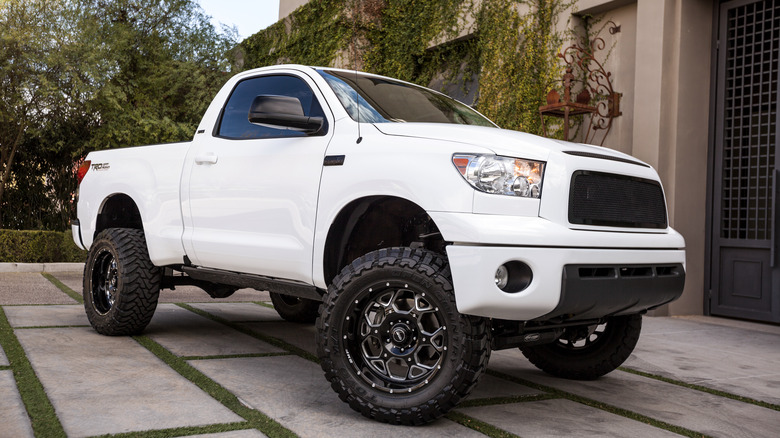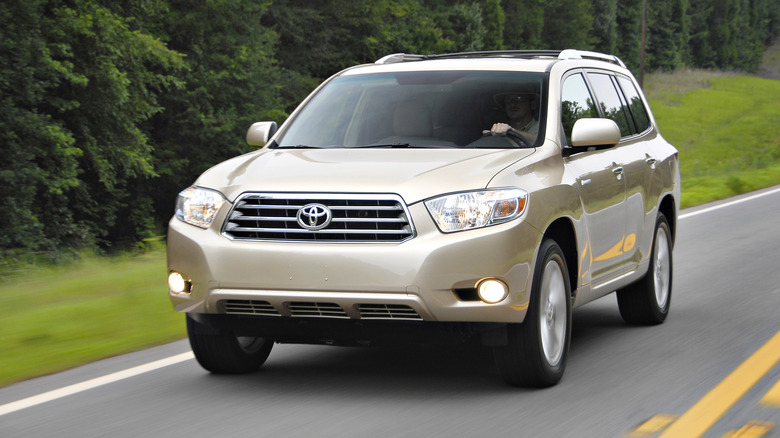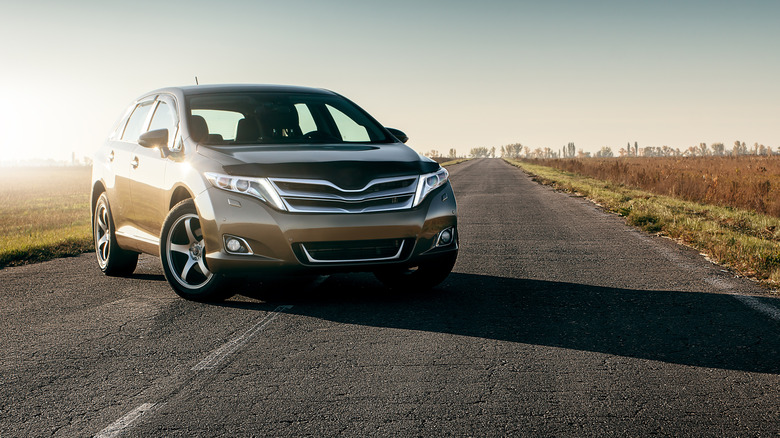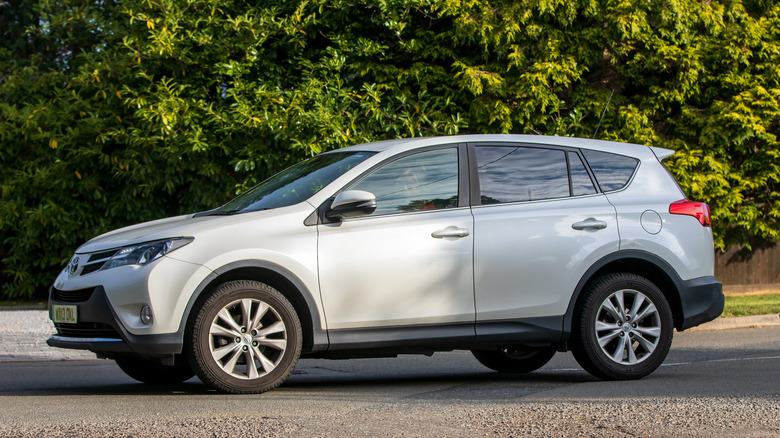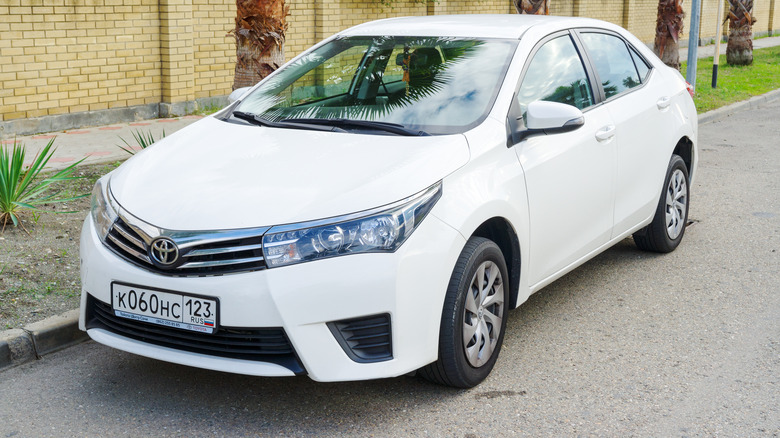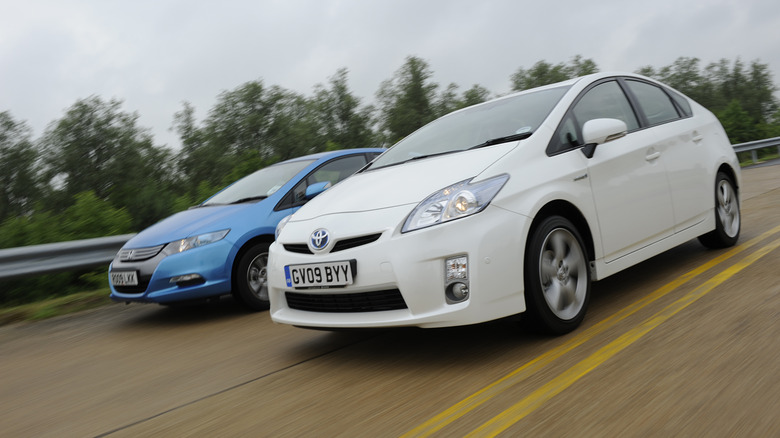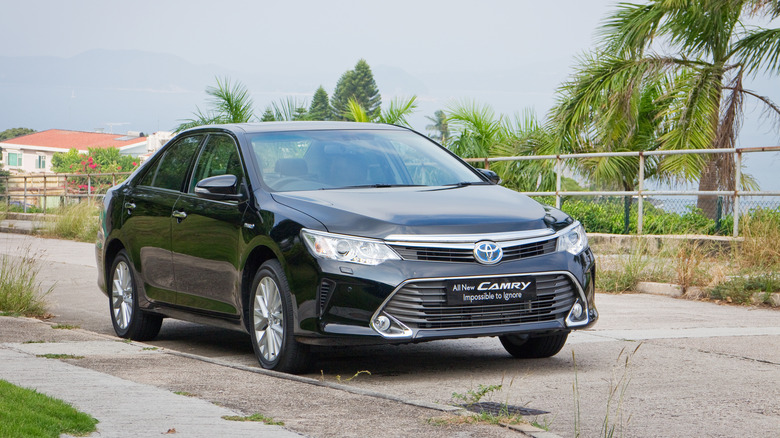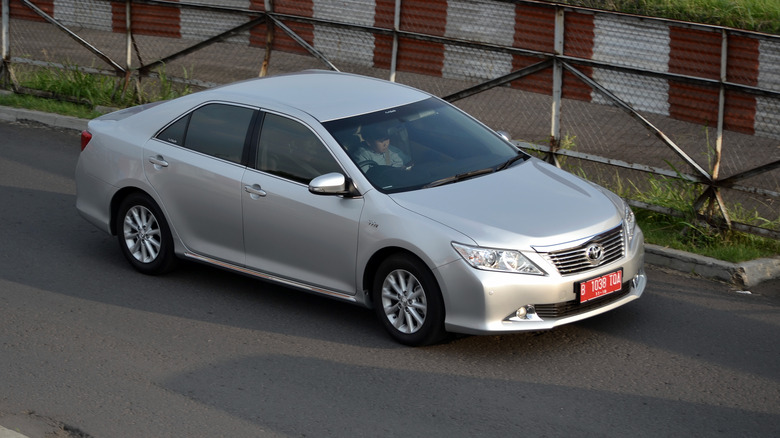The Most Reliable Toyota Models Ever Built, Ranked
Toyota makes some of the most reliable vehicles on the market. You can find the Japanese car maker at or near the top of nearly every reliability leaderboard, including Consumer Reports, JD Power, and RepairPal. What makes Toyota special is that no single model is skewing the average by being super-reliable. Nearly every vehicle Toyota makes is resistant to breakdowns. Most of its vehicles are in the top five for their categories and almost none of them are in the bottom 50th percentile.
In addition, Toyota has been making cars for a long time, and it's worked out a lot of the bugs. The famed Toyota Prius was one of the first popular hybrid vehicles, and Toyota's hybrid systems have only gotten better since then. There are also a high number of used Toyotas that have held their value well and continue to run to this day. It's a fairly safe bet that if someone asks for reliability, the answer is to tell them to buy a Toyota.
The consistency across the lineup and the advanced tech that goes into hybrid vehicles is how Toyota has earned its accolades as one of the most reliable automakers in the industry. Over the years, Toyota has laid very few eggs, but there are some vehicles during some years where everything clicked. These are the most reliable Toyota vehicles.
12. 2020 Toyota C-HR
The 2020 Toyota C-HR is among the best C-HRs ever made. It scores high across the board, with JD Power and Consumer Reports giving it high marks. It's also been shown to hold its value pretty well. There is an argument to be made that the car is still relatively new and could develop issues as it ages, but prior generations of the C-HR have held up well, so it's not a giant leap in logic to assume that this one will too.
Toyota did a lot right with the 2020 C-HR. It comes with a no-frills four-cylinder engine, a moderate amount of technology, and a decent amount of safety features as standard equipment. The small crossover curiously doesn't come with AWD, which is an oddity in the small crossover market. However, Toyota's little crossover returns decent fuel economy, and an AWD system would've lowered those numbers. Most reviewers refer to the engine as sluggish, but it's a car for putting around town, not tearing up the track.
Since it is newer, there is high availability for the 2020 Toyota C-HR. You can likely find at least a few of them on dealership lots near you. Pricing depends heavily on where you live, but you should be able to get a relatively good deal on one without a ton of miles on it. It's a good grocery runner that shouldn't break down on you.
11. 2017 Toyota 4Runner
The 2017 Toyota 4Runner is fairly excellent when it comes to reliability. It scores well everywhere it can, and there aren't a lot of complaints about it breaking down. It costs just under $700 per year to maintain, which is a tad high. However, this 4Runner makes up for it by having no safety recalls in its 6-year life so far. Essentially, it doesn't break down very often, but it can be a little expensive if it does. That said, there are much older Toyota vehicles that cost less to repair and break down less often.
The Toyota 4runner is an interesting vehicle in Toyota's lineup. It's a body-on-frame SUV, and one of the few left in a world being quickly populated by large unibody crossovers. The 2017 4Runner has excellent off-road capabilities for a vehicle of its size and it comes in a variety of configurations. However, every review we read noted its rough ride quality on paved roads, so it is far from a flawless vehicle. Every trim shared the same 4.0-liter V6 engine with the same five-speed automatic transmission. Fortunately, Toyota got those parts right, and they don't break down often.
It's quite a modern vehicle overall, and it still goes for well north of $30,000 used with about 60,000 miles. The low on-road comfort means this isn't the best buy, especially considering how nicely some of Toyota's other vehicles handle a highway. However, the engine is solid and, as far as 4Runners go, this one is among the best.
10. 2012 Toyota Sienna
The 2012 Toyota Sienna is among the most reliable models of the minivan's lifetime. It scores well on JD Power and Consumer Reports. RepairPal puts the average cost of ownership at around $566 per year, which is pretty decent for an older vehicle. You generally expect costs to rise with age as parts wear down, but the 2012 Sienna has held up quite well in that regard. It's also still worth nearly 50% of its original value on the open market, assuming that it's still in good condition.
Toyota built a winner with the 2012 Sienna. It comes with either a four- or six-cylinder engine, a smooth ride, and available AWD. Higher trims enjoyed amenities like entertainment displays for the back seat passengers and tri-zone automatic climate control. It also had some of the best cargo capacity in its class with 150 cubic feet of space with the seats laid flat. You could almost live in this thing. Reviewers cite a smooth ride and tons of storage as the minivan's main perks.
Despite its advancing age, you can still find these vans on sale. You'll most likely find them on the cheaper side of the dealership and also at dealerships that sell older or cheaper vehicles. Most of them have north of 100,000 miles and still go for around $15,000, depending on where you live. That's a tad pricey for a minivan that's over a decade old, but it shows how much staying power the 2012 Sienna has.
9. 2013 Toyota Tundra
The 2013 Toyota Tundra was one of the truck's best years. It's rated highly on the usual suspects like JD Power and Consumer Reports, but JD Power in particular is quite sweet on the truck. The average depreciation shows that it's still worth about half of its original value and the yearly repair average cost is about $640. All told, the 2013 Tundra has a lot going for it, and not breaking down very often seems to be one of those things.
Trucks are generally built to withstand hard work, which typically makes them more reliable than other types of vehicles. The 2013 Tundra is no exception. This was smack dab in the middle of the second generation of Tundra, and right before the model's 2014 facelift to modernize the interior a little bit. It came with either a V6 or a V8 depending on the trim level along with a no-fuss six-speed transmission. The fuel economy was abysmal, but such was life with big trucks in the early 2010s.
Believe it or not, used 2013 Toyota Tundras can still go for north of $30,000 in some areas for the highest trims. That's not terribly typical, but it's impressive. It's also not easy to find one of these with less than 100,000 miles without a dirty Carfax report, and it won't get easier as the vehicle gets older. If you can find one of these in good condition and don't mind the terrible fuel economy, there are decent odds that it'll last you a while.
8. 2008 Toyota Tacoma
The 2008 Toyota Tacoma is an excellent truck considering its age. It scores very well on the usual reliability authorities, but the bigger deal is the average yearly repair cost. It costs just over $400 per year to maintain one of these trucks on average, which is somehow hundreds of dollars less than the above Sienna and Tundra despite being five years older. That's some seriously low maintenance costs for a truck that old. That doesn't mean big repairs never happen, but they don't happen as often.
Toyota had all kinds of options for the 2008 Tacoma. There was a four-cylinder mated with a five-speed manual or four-speed automatic transmission. The V6 had a six-speed manual or five-speed automatic. All of those configurations are reasonably reliable, but the four-cylinder was a tad undersized for use in a truck. It suffered from a firmer ride quality, but otherwise, it's a perfectly serviceable old truck. Toyota had trims available for light work and light off-roading.
As with many older vehicles, there aren't a lot of these on the market. Most of the ones that are on the market are less than $10,000 and have high mileage. It's not unusual to see one with over 200,000 miles, which is yet another indicator of how reliable it is. Only a small percentage of cars make it that far. If you own one already, you can rest assured that you made a good decision.
7. 2008 Toyota Highlander
The 2008 Toyota Highlander is one of the best Highlanders in terms of reliability. Despite its age, it costs only $445 per year on average to maintain, which isn't half bad at all considering its age. It also scored well on reliability metrics from the typical authorities. The three-row SUV is more or less average for Toyota cars when it comes to resale value, although it has seen a boost in recent years thanks to the used car and chip shortage during the COVID-19 pandemic.
On the whole, the 2008 Toyota Highlander had few faults. Reviewers found the engine and ride comfort excellent, with an appealing amount of tech available for its year. It was powered by only one engine, an excellent V6 mated to a five-speed automatic transmission. It had better fuel economy than most midsize SUVs of its era. You could also get AWD for a marginal decrease in fuel economy. The third row was a little cramped, but otherwise, there wasn't much wrong with this vehicle.
As with any car this old, there aren't a lot of them left on dealership lots. They tend to go for less than $10,000 with more than 150,000 miles on them in most regions, although you can find the occasional gem here and there. A car this old isn't a bad idea for a beater that you can drive around, especially in the wintertime. There was also a hybrid variant that is fairly reliable in its own right.
6. 2014 Toyota Venza
The 2014 Toyota Venza was the second to last model before Toyota retired the line and brought it back in 2021 as a hybrid-only vehicle. It was also one of the Venza's best years, with high reliability metrics and a $489 per year annual repair cost. In terms of depreciation, the older Venza models are about average. Overall, it's a reliable pick that should last for many years to come since it's still less than 10 years old.
Unlike today's hybrid Venza models, the 2014 version came with either a four-cylinder or a V6 depending on the trim level. Both engines were reasonably fuel-efficient, although far from leaders in the segment. Reviews noted good power from the V6 along with a good ride quality and a well-equipped interior. Minus the V6, today's Venza shares a lot of those same characteristics, especially with the interior and ride quality. It did almost everything correctly and was at or near the top of the best two-row crossover lists from that year.
Used 2014 Toyota Venzas are still available on dealership lots. Most of them have more than 100,000 miles at this point, but still go for around $15,000. Thanks to their high reliability, they should last quite a while longer, although they are still a bit expensive for their age and mileage. The newer hybrid Venzas are objectively nicer vehicles as a function of technology moving forward, but the 2014 model is still among the most reliable.
5. 2013 Toyota RAV4
The Toyota RAV4 has always been a reliable vehicle. The 2008, 2010, and 2013 models stand out in particular for being slightly more reliable than other model years. We'll focus on 2013 since it's the newest one. On top of their typical high reliability scores, the 2013 variant costs, at most, under $450 per year on average to maintain. That's lower than a lot of vehicles, including some other Toyotas on this list. Perhaps even more impressive is the fact that this 10-year-old still garners a hair more than 50% of its original value. People are sweet on the RAV4, and it shows.
Toyota's flagship crossover SUV had a good year in 2013. Reviewers praised its cargo capacity, able handling, smooth ride quality, and decent fuel economy for a crossover. The 2013 model year was the first RAV4 not to come with a V6 engine, making do with a 2.5-liter four-cylinder engine. There were only three trim levels as well, which helped keep the RAV4 a tidy package. The highest trim came with things that currently come standard on a lot of cars, like keyless entry. In other words, there weren't a lot of gadgets and bobbles to break in the cabin of the 2013 RAV4.
You can still find these hanging around on dealership lots. They usually have around 100,000 miles on them, and go for around $15,000. Of course, availability and price will vary depending on where you live. The price is a little high for a car with 100,000 miles on it, at least it was before the COVID-19 pandemic.
4. 2016 Toyota Corolla
The 2016 Toyota Corolla is one of the most reliable cars that the company has ever built. It swims through the reliability metrics. It has among the lowest annual repair costs of any Toyota on the list at $370 per year. Corollas also generally hold their values pretty well, with 10-year-old models keeping more than half of their original value in many cases, even when they are well over the 100,000 mark. In short, these things live a long time, and their costs and resale value reflect that.
For the 2016 model year, even reviews took note of the car's long-lasting four-cylinder engine. Unfortunately, that was one of the few highlights. The 2016 Corolla had a dearth of technology, including a lack of some safety systems that were becoming standard at the time. It was also a fairly boring car to drive, with tepid acceleration and middling handling for a car of its size. Still, the fact that the parts inside it seem to want to last for ages more than makes up for the lack of driving dynamics for folks who really want reliability first.
This is one of the newer vehicles on the list, so there are still plenty on the market. They tend to go for around $15,000 with around 60,000 to 80,000 miles on the odometer. That means most of the 2016 Corollas on the market still have plenty of life left in them, and it's not a bad budget car, especially if all you need is to run around town and get groceries. It also gets up to 35 mpg combined depending on the trim, which is excellent fuel economy.
3. 2008 Toyota Prius
The 2008 Toyota Prius was a surprisingly reliable car, especially when you consider that it had a hybrid drivetrain back when those weren't very common. JD Power and others gave it a high rating, while RepairPal shows that the average annual cost of the 2008 Prius was around $370. Even when you look at recent repair histories, there aren't many major repairs. This little thing just keeps chugging along. It's not common for any car to eclipse 250,000 miles, but the 2008 Prius seems to do it more often than most.
In terms of performance, the 2008 Prius had other plans. It had amazing fuel economy for its day, with 48 mpg in the city and 45 mpg on the highway. It paid the price for that fuel economy by taking more than 10 seconds to hit 60 mph. This was a car that was built for grocery store trips. The interior was roomy, and the drive was otherwise comfortable. Its egg shape was the subject of debate in the late 2000s, but ultimately, a lot of other vehicles followed suit.
Even if there were a lot of 2008 Prius models available today, it's probably not the best idea to buy one. Hybrids require batteries and batteries degrade over time. Even if this car runs until the heat death of the universe, the batteries are going to need some attention eventually. Most Prius vehicles still on the market go for well under $10,000 and have well north of 150,000 miles on them. There was one we found in our research that had almost 300,000 miles. If that doesn't tell you how reliable this car is, nothing will.
2. 2014 Toyota Camry Hybrid
The 2014 Toyota Camry Hybrid was an excellent vehicle in its heyday. It has one of the highest reliability scores from JD Power of any Toyota model from any year. It was also scored very highly by other authorities. RepairPal says the 2014 Camry Hybrid costs under $400 per year to maintain, which is also an excellent result for a car that old. It competed well with the Prius, especially the older ones.
Hybrids have come a long way, but the 2014 Toyota Camry Hybrid was pretty nice on paper. It pulled solid acceleration numbers while still maintaining a 41-mpg combined rating. It otherwise had all of the usual appeal that you would have out of a regular Camry. There weren't any glaring weaknesses with the vehicle, but it also didn't excel in any substantial way. It was just a rock-solid sedan that got great fuel mileage and lasted for a long time without the need for major repairs.
It's not that old of a car, so you can still find some available on dealership lots. Some of them go for as much as $20,000, although it's getting rarer as the car ages. Most used Camry Hybrids have fewer than 100,000 miles, which means remaining units should last for a long time. Hybrid batteries have a shelf life, but otherwise, this car just doesn't break down that often.
1. 2014 Toyota Camry
Okay, so imagine all of the benefits and high reliability of the 2014 Camry Hybrid, and then strip out the complex hybrid drivetrain parts. What you're left with is one of the most reliable vehicles ever built in the regular 2014 Camry. JD Power gives it a 92 out of 100 rating in terms of predicted reliability, which is an outstanding score. RepairPal backs that up with a relatively low annual cost of repair and it's backed up even further by a high Consumer Reports rating. Obviously, the car still breaks down, but it just doesn't do it as often as other cars.
The 2014 Toyota Camry was a well-equipped vehicle. It came with a four-cylinder with an optional V6 upgrade, and both were good performers. The four-cylinder returned 28 mpg combined while the V6 did a respectable 25 mpg combined. Additionally, the ride was soft, and the technology was mostly good. Most of the complaints centered around the spartan interior on lower trims and a ride that felt floaty on highways. The dull handling was also a point of contention. Despite its decent acceleration numbers, this car tended to feel better in the city than on the freeway.
These cars are still available today, and at around the same price as the hybrid models. It's not unusual to see them peep up over 100,000 miles while still costing north of $10,000. That's a little pricey, but the reliability history is there, so even cars with 100,000 should last a while, for a car that old that's been driven that much.
